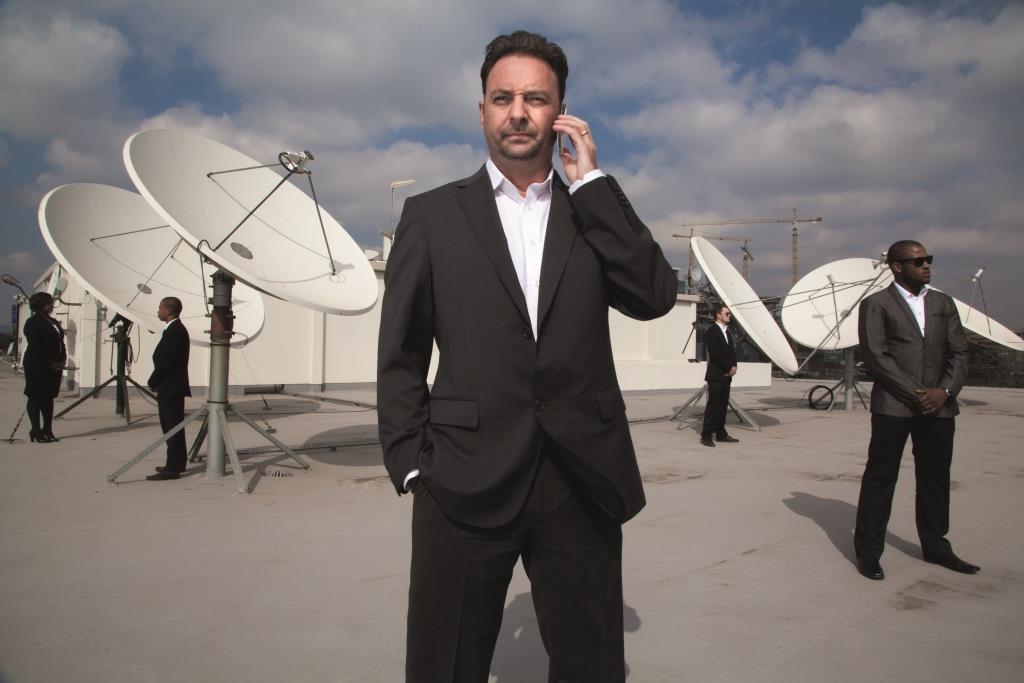For most businesspeople the word ‘metadata’ means little. They should know. Simply put, metadata is embedded in every SMS and email and carries the telltale story of your business. This is the word from intelligence expert, Morne Walters, who has spent 15 years stopping snoopers.
Imagine you are a big-time CEO: you’ve gone into a private meeting to close a deal; you pitch a price; you leave. The first thing you do is get on the phone and tell somebody about how it went. But what you don’t know is that the person you are calling has had his phone tapped.
It seems like it’s a story out of a movie but it’s becoming an everyday reality. Walters sits comfortably across the table sipping a cappuccino in Johannesburg. He’s a world away from James Bond, coming from a small town in the Free State, South Africa, and says he prefers the shadows to the limelight. What he does carry is three cellphones that have military-grade protection. Spying in business is on the rise, warns Walters.
Pieter Roux agrees. Roux who has spent two decades encrypting codes for cell phone companies says with more people using smart technology, ignorance is one of the leading reasons why viruses are on the up.
“People still think phones are used only for phone calls, a misconception. It’s more likely there will be security breaches on your android than on your computer because of the nature to think that you are immune on your cell,” says Roux.
Loading...
Andrew McHenry, another sage with two decades in the IT business, says spying is the talk of programmers. So much so, that they believe everyone moving their data into cloud storage could spell danger. He has seen a rise in products designed to stop hackers like protected SIM cards and $60,000 HTC cell phones, sold to government security offices.
Roux believes the cost of protection will prove too much for consumers. The solution lies in software development, where apps can be screened for viruses. While there is an increase in espionage, Roux thinks many hackers have not yet tapped into the industry.
“Most hackers are not willing to spend the effort decoding something. It is far more common to receive a spoof email, than to have someone who wants to eavesdrop on your calls. It’s easier for fraudsters to scam people with false websites, it is more the trend. We have seen an increase in the one in a million being gullible enough to respond to an email than on phones.”
Most businesspeople cannot take the chance, says Walters.
“While your intentions are genuine, this is industrial espionage, industrial thievery. People get the upper hand. Companies can lose billions of dollars this way. If you and I tender for a deal, and you know that I am going to tender for a million dollars, you can come in at $990,000. Information is used to get ahead of the game,” says Walters.
In September last year, Walters came up with a smart device application to protect classified government installations—he thought he could do the same for business. Five months later, Seecrypt, a-state-of-the-art military-grade encryption app, was born, technology straight from the battlefield to the board room.
“Understanding security means you have to think like a thief. To protect people in privacy, you have to understand how people can access information,” says Walters.
The app works by dialling subscribed clients on a private internet network line. Behind the scenes of an easy-to-use interface, when you make a call the program generates a key by sampling audio noise and a random set of numbers. The key, which has a length of a number to the power of 667, is then re-encrypted a second time before being sent.
Interestingly, it was the Edward Snowden case that made this system popular.
Snowden is the former American intelligence analyst, who exposed American and British government mass surveillance programs to the world; secret programs that had been collecting metadata from millions of internet and cellphone conversations across the globe. His disclosure is said to have ranked among the most significant security breaches in American history.
The news broke when Walters was flying to Johannesburg from the Middle East. By the time he had landed in South Africa, the phone was ringing; including a call from a royal family.
“It was surreal. It was one article from one newspaper and people kept asking how true it was. If you go back to that night it was launched. It was so outrageous that people didn’t believe it at first. By the following Thursday, it was all over,” he says.
Since April, Walters has seen a 400% growth in subscriptions from owners of tens of thousands of phones, laptops and landlines being secured from Nairobi to Washington D.C.
“When we say to people someone is listening to your calls or reading your messages we were told that we were being paranoid. Well the evidence speaks volumes. The reality is that what has been shown in the media has been just the tip of the iceberg. Every country in the world does it. The time has arrived for corporate companies to protect their data,” he says
Walters gathered a number of what he calls ‘sages in the intelligence business’—some poached from the US secret services, the UK ministry of defense and the African Defense Force. Walters now has a team of developers, averaging 25 years of age, fueled by bottomless coffee and containers of jelly beans.
They run a tight operation, working around the clock broken by the odd siesta on a couch. Walters is an entrepreneur, who is likely to make millions out of paranoia, eavesdropping and the fall of Snowden.
Loading...
